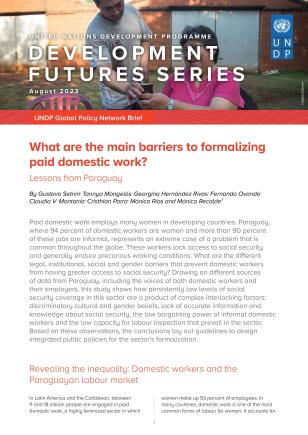What are the main barriers to formalizing paid domestic work? Lessons from Paraguay

What are the main barriers to formalize paid domestic work - Lessons from Paraguay
pdf (0.5MB)
DownloadWhat are the main barriers to formalizing paid domestic work? Lessons from Paraguay
August 23, 2023
Paid domestic work employs many women in developing countries. Paraguay, where 94 percent of domestic workers are women and more than 90 percent of these jobs are informal, represents an extreme case of a problem that is common throughout the globe. These workers lack access to social security and generally endure precarious working conditions. What are the different legal, institutional, social and gender barriers that prevent domestic workers from having greater access to social security? Drawing on different sources of data from Paraguay, including the voices of both domestic workers and their employers, this study shows how persistently low levels of social security coverage in this sector are a product of complex interlocking factors: discriminatory cultural and gender beliefs, lack of accurate information and knowledge about social security, the low bargaining power of informal domestic workers and the low capacity for labour inspection that prevail in the sector. Based on these observations, the conclusions lay out guidelines to design integrated public policies for the sector’s formalization.

 Locations
Locations




